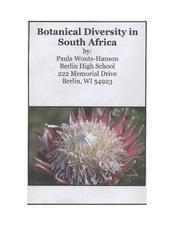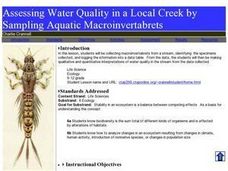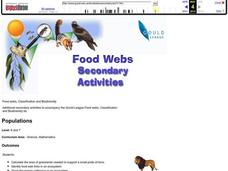Curated OER
Non Native Species: English Ivy-Landscape Plant or Deadly Killer?
Students examine an area overrun by English Ivy. They explore how invasive species affect an ecosystem. They also study about the lack of biodiversity and how to measure it out in the field.
Curated OER
Does the increased use of fertilizers effect biodiversity?
Students conduct a hands-on lab activity in which they analyze a sample of water from a local stream or pond. They introduce a fertilizer solution into the sample and analyze and describe their findings.
Curated OER
Ecology - Biodiversity Lab
Studnents examine the degree of biodiversity that exists in one's everyday environment, in order to develop an understanding of how scientists classify organisms and to explain why biodiversity is important for living things.
Curated OER
"The Science Times"
Students create their own newspaper after gathering information at the Museum of Natural History's Hall of Biodiversity.
Curated OER
Relationships and Biodiversity
Students examine diversity on the planet and the differences within a species. In this investigative lesson students complete a lab that allows students to better understand the relatedness between plants.
Curated OER
Botanical Diversity in South Africa
Ninth graders explore the history and culture of South Africa. In this South African lesson, 9th graders create individual art pieces to be joined in the construction of a quilt.
Curated OER
Evolution
In this evolution worksheet, students review genetic variability, gene mutations, biodiversity and adaptations. This worksheet has 22 fill in the blank and 10 short answer questions.
Curated OER
Natural Vegetation
In this earth science worksheet, students identify and locate various vocabulary terms related to natural vegetation. There are 21 earth science terms located in the word search.
Curated OER
Coastal Biodiversity
For this earth science worksheet, students identify and locate vocabulary terms related to coastal biodiversity. There are 22 words located in the puzzle.
Curated OER
Assessing Water Quality in a Local Creek by Sampling Aquatic Macroinvertabrets
Learners experiment collecting macroinvertebrates from a stream and identify the specimens collected and then log in the information into a data table. From the data, they make qualitative and quantitative interpretations of water quality.
Curated OER
Got Biodiversity?
Students examine the concept of biodiversity. Using the internet, they complete small activities in which they work together. Using the information they collected, they create a class book, make murals and write in their journals.
Curated OER
Relating Number of Insect Species to Water Quality
Students are asked to respond to questions such as:" Have there been surveys of the area to inventory the species?" (For example, for a wetland area, do they know what amphibians live there and how abundant they are?) Are there any...
Curated OER
Identifying Insects
Students collect samples of insects and identify them. They evaluate water conditions that causes species to be found in streams and listen to sounds of water through music. Next, they respond to the music and discuss their reactions.
Curated OER
Go Green!
Pupils use this outdoor sensory activity as a self-guided or as part of a facilitated programme. It encourages individual observation and exploration in the forest. Students can choose to work as an individual or work in pairs. They...
Curated OER
Coastal Biodiversity of South Africa
Young scholars investigate the biodiversity found along the coast of South Africa. They conduct research using a variety of resources. They use the information in order to write lab reports with the data. The lesson plan can be adapted...
Curated OER
Tropical Regions/Mapping Biodiversity
Pupils use a world map to locate the country of Puerto Rico. In groups, they identify the various types of vegetation found on the island. They compare and contrast the biodiversity of the country to the United States. To end the...
Curated OER
Critical Habitat
Students watch the video clip and create a web map showing the cycle between producers, consumers and decomposers. They also tell why it is important to conserve the old-growth forests.
Curated OER
Art of Biodiversity
Learners familiarize themselves with values of biodiversity. They comprehend that biodiversity has inspirational and cultural values. Students locate five works of art on Zoo grounds that represent biodiversity in some way.
Curated OER
Biodiversity
Students are challenged to examine the diversity of their own forest and make comparisons to a tropical rainforest. By exploring and grouping tree and insect types in their local forest, students will develop an understanding of diversity.
Curated OER
Seeing a World of Difference
Young scholars read through the lyrics and listen to a song about biodiversity. Using pictures they draw, they interpret the song according to their prior knowledge. They identify the threats to different regions around the world and...
Curated OER
Aqualung , the New Age Garden
Students examine how underwater landscape could be used for food production in the future. They discuss underwater landforms, draw a picture of an underwater landscape and a type of technology to use underwater, and write a description...
Curated OER
How Can We Observe Genetic Variation Within a Species?
Young scholars observe intra-species variation by completing standard microbial streaking procedures. They collect data from which they draw observations and complete a worksheet.
Curated OER
Adaptations
Students identify features of animals that enable survival in particular environments and group animals on the basis of their similarities. They compare and contrast features of groups of animals.
Curated OER
Populations
Students calculate the area of grasslands needed to support a small pride of lions. They also identify food web links in an ecosystem and trace the energy pathways in an ecosystem.

























